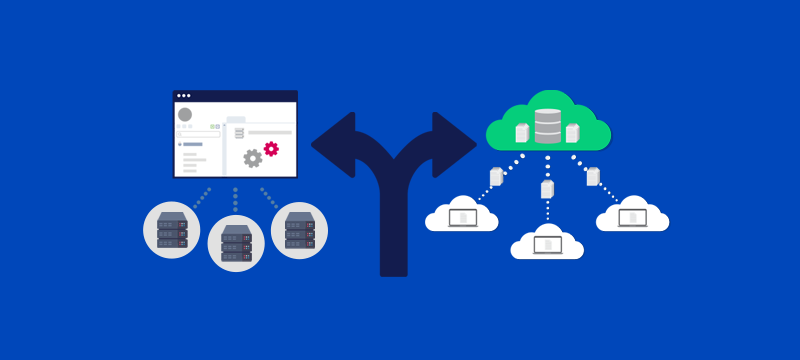Stepping up to a bigger hosting solution is a major step that needs careful consideration. For most companies, the choice narrows to two options: a managed dedicated server or cloud hosting. Both these provide significant computing capabilities including large scale storage, high performance and the ability to run mission critical applications.
However, these solutions provide very different environments, each with its advantages and disadvantages. Choosing the right one depends upon the needs of the company.
Similarities of managed servers and cloud hosting
Both managed servers and cloud hosting offer users a powerful, reliable and comprehensive server environment. They can use the same OS, run the same services and apps, they have similar server administration and use the same control panels.
In this respect, there isn’t much to distinguish them. Beyond, this, however, there are a range of differences which can make each one more useful to a business than the other.
Characteristics of cloud servers
The principal difference between cloud hosting and a managed server is that the cloud server you’ll be hosted on is a virtual machine whereas a managed server is a physical one.
While the cloud server needs a highly powerful physical server to be run on, specialised software creates an environment where the physical machine and the virtual server remain independent.
This means it is possible to run a number of virtual servers on one physical machine, as with a VPN or run a virtual server across different machines. A typical cloud platform will consist of lots of physical servers, each hosting a number of virtual ones.
An important benefit of virtualisation is that cloud servers can be moved across machines. If there is a hardware failure, the virtual server can be moved to another physical machine and continue running – without downtime. Even if an entire datacentre goes offline, it can be moved to another one. This is why some web hosts are now able to offer 100% uptime guaranteed by SLAs.
One of the key advantages of a virtual environment is that servers can be operated like software. If a new virtual server is needed, it can be created and deployed very quickly and can be given additional computing resources, such as storage space and RAM, whenever it is needed. This gives cloud the upper hand over managed servers when it comes to creating a on-demand, self-service system.
Another advantage of cloud hosting is its scalability. Businesses who need more computing resources can have them instantly, enabling them to deal with unexpected web traffic spikes, big data analysis without delay. This means cloud users are never going to be in a position where the demands on resources outstrip its capabilities, ensuring that critical applications and important operations are always available.
There are financial rewards for moving to a cloud environment, too, as cloud hosting can be much less expensive than using a managed server. The instantly available virtual server has no hardware set up costs and, as cloud is charged for on a pay-as-you-go basis, you only pay for the resources you need.
If you need to scale up temporarily, there’s no requirement to upgrade your package or buy an extra server, you just pay extra for the additional resources you used.
Cloud also has advantages from a management perspective. While you will want to manage your own applications and environment, the physical hardware, virtualisation software, operating system and security are all maintained by the service provider.
Characteristics of managed servers
A managed server is physical computer which means that all the resources it is equipped with are solely for your use. One of the reasons they take longer to deploy than a cloud server, is that customers have the ability to pick and choose the right hardware configuration.
You get to choose the CPU model, the number of cores, the RAM and the type (SSD or HDD) and size of the hard drive. This ability to control the configuration of your machine is why they are known as dedicated servers everything about them is dedicated to fulfilling your needs.
For this reason, a managed server can be more powerful than cloud servers. They are able, for example, to deliver better compute and IO performance, especially if the server uses multiple high-speed CPUs, an SSD hard drive and large DDR4 RAM. If you need even greater capacity, this can be achieved by clustering a number of managed servers.
Financially, dedicated servers can be more expensive than cloud hosting, as payment is required for all the dedicated resources. However, as a managed service, hardware maintenance, OS updating and patching come with the package. With some providers you’ll also get a 100% uptime guarantee, which makes it ideal for running critical apps.
Managed servers have a wide range of uses, for example, hosting large, busy websites, databases and web applications. They are also used by organisations that store sensitive data and need to comply with stringent regulations.
Unlike cloud hosting, a managed server is not part of network where hardware is shared by different users. This isolation makes it more secure for the storage of sensitive data.
Conclusion
Managed servers and cloud hosting both provide the resources needed to run large websites and critical applications.
Cloud servers are quicker to deploy, less expensive to operate and easier to scale up. Managed servers are built to specification, highly powerful and offer increased security. Both offer high availability.
If you are considering cloud hosting or a managed server and need help in deciding which is right for you, call us on 0800 862 0380 and we’ll be happy to advise.



